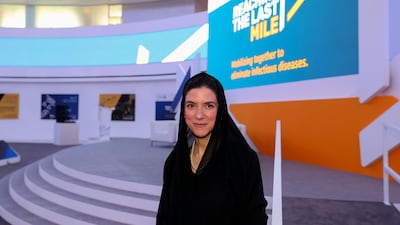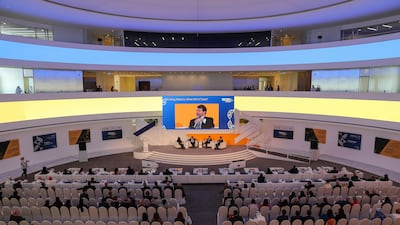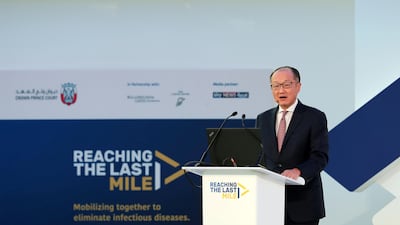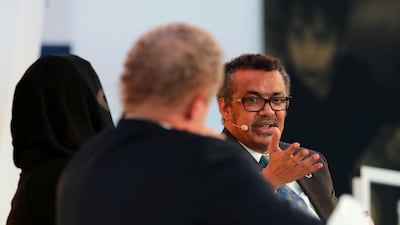Sheikh Mohammed bin Zayed, Crown Prince of Abu Dhabi, has contributed US$20 million to a new, $100m fund to rid the world of two devastating infectious diseases.
The Reaching the Last Mile Fund, announced at a major global summit in Abu Dhabi on Wednesday, will receive another $20m (Dh73.4m) from the Bill and Melinda Gates Foundation and $30m from the British government.
The fund will finance work towards eliminating river blindness and lymphatic filariasis, also known as elephantiasis, which afflict millions worldwide.
A new research institute that will develop policies to combat infectious disease was also announced. It will be based in Abu Dhabi.
Sheikh Mohammed, also Deputy Supreme Commander of the Armed Forces, said he was proud to announce the $100m fund.
“The fund reflects our long-term vision to save lives and put an end to neglected tropical diseases,” he tweeted. “There are inspirational models that have touched people’s lives, and their initiatives have left a clear mark on humanity.
“Most notably is my friend Bill Gates. I send you my sincere appreciation and gratitude for your charitable efforts.”
The announcement of the fund was the centrepiece of the Reaching the Last Mile forum in Abu Dhabi, which aims to eradicate two diseases – polio and Guinea worm disease.
Others including malaria and river blindness still bring misery and sickness to millions around the world, particularly in Africa.
The forum was held under the patronage of the Crown Prince and supported by the Gates Foundation.
Watched by an international audience of experts, leaders and health experts, Mr Gates was presented with the Federation Medal, one of the country’s highest awards, by Sheikh Mohammed in recognition of his contribution to supporting disease eradication.
The Crown Prince also presented a new award that acknowledges outstanding contributions made by individuals in the fight against disease.
Among those honoured was former President Jimmy Carter, whose Carter Centre has been in the forefront of combating Guinea worm disease, a parasite that once infected hundreds of thousands, but has now been reduced to a handful of cases in Africa, thanks to a global eradication campaign.
President Carter could not attend the event in Abu Dhabi, but spoke to the The National from the United States.
“I'm very honoured to have it [the award], not only because it’s a symbol of the long term friendship we’ve had with the United Arab Emirates, and particularly my personal friendship with Sheikh Zayed a number of years ago," he said.
“This will give us not only an access to the Arab world, but also helps us financially, and gives us a good partner with other decisions that we are fighting together.”
In 1991, President Carter met Sheikh Zayed for the first time and received a donation of nearly $6 million for the Carter Centre to begin combating Guinea worm disease. Of his first meeting with Sheikh Zayed, President Carter said: "I remember it quite well, we got along famously, person to person.”
The REACH (Recognising Excellence around Champions of Health) Awards included one for Special Achievement given to to Abdullah Al Ghafli, the director of the United Arab Emirates Pakistan Assistance Programme.
The UAE has been central to vaccination efforts in Pakistan, treating more than three million children.
The Reaching the Last Mile Fund will be administered by the END Fund, a philanthropic investment platform focused on tackling the five most common neglected tropical diseases, also known as NTDs.
The $100 million raised will be spent over ten years to fast track attempts to eliminate both diseases. While four countries in Latin America have been verified as free of river blindness. the disease is endemic in 29 countries in Africa and the Middle East.
Tlymphatic filariasis threatens 856 million people in 53 countries worldwide and can lead to the abnormal enlargement of limbs andsevere disability and social stigma.
Support with in-kind contributions was also announced by two of the world’s largest drug companies, GlaxoSmithKline, and MSD, also known as Merck.
They will donate doses of the drugs albendazole and ivermectin, used to treat and eliminate lymphatic filariasis and river blindness, through the Mectizan Donation Program, with co-investments from the UK Department for International Development and and United States Agency for International Development (USAID).
Dr Frank O Richards, director of the River Blindness Elimination Programme at the Carter Centre, said it could take another ten years to wipe out the disease.
River blindness is a disease of the skin and eye caused by a parasitic worm. The worm is transmitted to humans by black flies, which breed in fast-flowing rivers and streams. Populations living near or in close proximity to these breeding grounds are susceptible to becoming infected. Chronic infection causes itching, disfiguring skin lesions, eye lesions that can lead to irreversible blindness, and likely causes epilepsy.
____________
Read more:
Malaria kills two children every minute - and experts fear it'll worsen without more action
Two million children die from preventable diseases each year, Abu Dhabi health conference hears
New awards honour the courage of those fighting some of the world's worst diseases
____________
“River blindness will take another ten years or so. I think the goal is now 2025. I think that is an aspirational goal but I certainly think we will be through by 2030, if not before, and I think that by the time we get to 2020 we will really only be working on river blindness in just a couple of remaining countries.”
He said it was important to recognise the sheer difficulties in entirely wiping out a disease.
“That final inch is very challenging, there is no point where it gets easier it is not like you reach the top of the hill and then you coast the bottom. The beginning is hard and the middle is hard and the end is hard. Reaching the last mile is a big challenge.”
Announcing the new fund, Mr Gates told the forum that huge steps had already been made in fighting many infectious diseases, including polio, which has been reduced to only 14 cases this year, all in Pakistan and Afghanistan.
The Microsoft founder also paid tribute to the UAE’s role in health education and vaccination against polio, especially in Pakistan.
“It has taken an amazing global partnership to get to this point, including critical support from the UAE,” Mr Gates said.
It was fitting, he said, that the forum was being held in the UAE, which has done so much to coordinate international efforts to combat infectious diseases, through the contributions of Sheikh Zayed and Sheikh Mohammed.
New technologies and new drugs were essential to continue the fight, Mr Gates added, especially when the virus in mosquitos has developed resistance to existing treatments.
“We have the opportunity to end diseases that have plagued mankind for centuries,” Mr Gates said.
Referring to Sheikh Zayed’s early donations, he said that "the UAE’s contributions to global health goes back decades".
The forum was also attended by Reem Al Hashimy, the UAE Minister of State for International Cooperation, Abdul Rahman Al Owais, the UAE Minister of Culture, Youth and Community Development, Dr Maha Barakat, Advisor to the Executive Abu Dhabi Government and board member of the Roll Back Malaria Partnership, Jim Yong Kim, President of the World Bank Group, and Dr Tedros Adhanom Ghebreyesus, Director General of the World Health Organisation.








